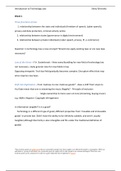Introduction to Technology Law Shrey Shrestha
Week 1
Three functions of law:
1. relationship between the state and individuals (freedom of speech, (cyber speech),
privacy and data protection, criminal activity online
2. relationship between states (governance in digital environment)
3. relationship between private individuals (cyber speech, privacy, IP, e-commerce)
Question: Is technology law a new concept? Should one apply existing laws or are new laws
necessary?
Law of the Horse – F.H. Easterbrook – New name/bundling for new field of technology law
not necessary- study general rules for new fields in law
Opposing viewpoint: Tech law field gradually becomes complex. Disruptive effect that may
arise requires new laws.
Shift into digitization – from rivalrous to non-rivalrous goods* - does a shift from vinyls to
YouTube mean that one is streaming the music illegally? - Principle of exclusion
- Single ownership to more users at once (streaming, buying music)
e.g. A&M v Napster- Copyright infringement
Is information tangible? Is it a good?
Technology is a different type of good, different properties from ‘movable and immovable
goods’ in private law. Didn’t have the ability to be infinitely scalable, and aren’t usually
tangible (although Electricity is also intangible and fits under the traditional definition of
goods)
*Non-rivalrous goods are public goods that are consumed by people, but whose supply is not affected by people’s consumption. (When an
individual or a group of individuals use a particular good, the supply left for other people to use remains unchanged. Therefore, non-
rivalrous goods can be consumed over and over again without the fear of depletion of supply)
,Introduction to Technology Law Shrey Shrestha
Rivalrous goods- consumption of one consumer prevents simultaneous consumption by other consumers, or reduces ability of another party
to consume it.
Digital Convergence: The modern smartphone integrates various technologies into it
(camera, phone, computer, radio) – brings about legal challenges
Cost of storing bits cheaper, cost and speed of transmitting bits falls- demand of consumers
increased
Big Data: information collection, aggregation and exploitation
Who owns the internet cables? What rules govern the apps?
Net Neutrality: Principle that data packets on the internet should be moved impartially,
without regard to content, destination or source – accessibility to the internet.
Legal challenges- How should laws regulate technology?
Regulation (EU) 2015/2120 on Open Internet Access
Four important principles:
1. No blocking (of lawful content, applications, services or non-harmful devices)
2. No throttling : no intentional slowing or speeding of internet service
3. No discrimination
4. Transparency (and proportionality) of measures – providers, must disclose
information regarding their network management practices, performance and the
commercial terms of service
Not applicable everywhere else, only in European context
Article 3- Reader- Safeguarding of open internet access - net neutrality
Article 6- Remedies ( penalties) - effective, proportionate and dissuasive
Relevance of net-neutrality debate:
, Introduction to Technology Law Shrey Shrestha
- Allows us to think about freedoms- online speech, monopolies
(highly debated) , use applications without interference, fast
browsing speed
Where does this freedom come from? Are we creating new rights?
Legal challenges:
How should laws regulate technologies:
- Technology is complex, develops rapidly
Technology specific laws or Technology neutral law (preferable, but specificities needs to be
considered)
Jurisdiction Puzzle
Where does all of this happen? Which country has jurisdiction? Which law applies? – Cross-
border challenge
Digitization challenges lawmakers
Lawmakers: keep old laws and let courts interpret or introduce new rules or let the code
regulate/market (companies decide our behavior) – but which lawmaker who has to make
these decisions/applying is not always clear.
Three effects of the move from industrial to the informational society:
- Represents shift from ownership- control of things to ownership-
control of information
- New and revolutionary model to market and deliver products and
services
- Move from rivalrousness to nonrivalrousness





